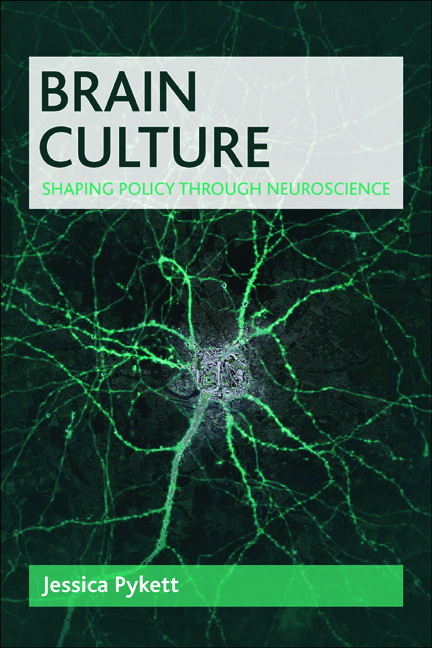Book contents
- Frontmatter
- Dedication
- Contents
- About the author
- Acknowledgements
- Preface
- One Introduction: governing through brain culture
- two Brain culture in context
- three Designing cerebral cities
- four Teaching the learning brain
- five Managing workplace emotions
- six Conclusion: what is at stake in the brain world?
- References
- Index
six - Conclusion: what is at stake in the brain world?
Published online by Cambridge University Press: 10 March 2022
- Frontmatter
- Dedication
- Contents
- About the author
- Acknowledgements
- Preface
- One Introduction: governing through brain culture
- two Brain culture in context
- three Designing cerebral cities
- four Teaching the learning brain
- five Managing workplace emotions
- six Conclusion: what is at stake in the brain world?
- References
- Index
Summary
From the bio-social to the psycho-spatial
As the varied manifestations of brain culture explored in this book indicate, neuroscientific, psychological and behavioural research has become increasingly influential in a range of fields of public policy and practice. Both the application of such research and the more diffuse discursive influence of brain culture are evident in a number of arenas in which our actions, behaviours and subjectivities are under formation. Brain-based explanations are now common in Western popular cultural understandings of ourselves, others and society, as well as in the kinds of research and knowledge which are (economically and politically) valued. But human action, behaviour and subjectivity are situated in particular geo-historical contexts, conditioned by prevailing social, economic, cultural and political rationalities, and are shaped by and within the context of brain culture itself. The circularity of this brain world thus plays a constitutive role in each of the particular social contexts investigated throughout the book. I have sought to identify in each of these worlds what is at stake in terms of the governance of citizens. How does the re-framing of human ‘nature’ through brain culture have an impact on the assumptions that governments, experts and actors make about governing the self?
This book has explored how narratives concerning our predictable irrationality, error-prone decision-making and automatic, preconscious action are at work in re-imagining the citizen as a political agent, and as a target of governance. It has considered the specific techniques used in governing citizens through brain culture in different social spheres, and the practical processes of subjectification that are mobilised in brain-targeted interventions. Specific forms of scientific knowledge, research networks and academic infrastructures are called on to rationalise the goals of self-actualisation, self-mastery and self-optimisation. New experts have been called forth to direct our attention, orchestrate our experiences and shape our spaces of action in this brain world. In sum, new forms of behavioural governance have begun to imply a new relation to our (un)willing selves.
The ascendance of brain culture is not necessarily a revolution in thought and practice. It is part of a much longer history in which the role of the brain in determining human character, agency and social mores has been widely debated.
- Type
- Chapter
- Information
- Brain CultureShaping Policy through Neuroscience, pp. 171 - 184Publisher: Bristol University PressPrint publication year: 2015



